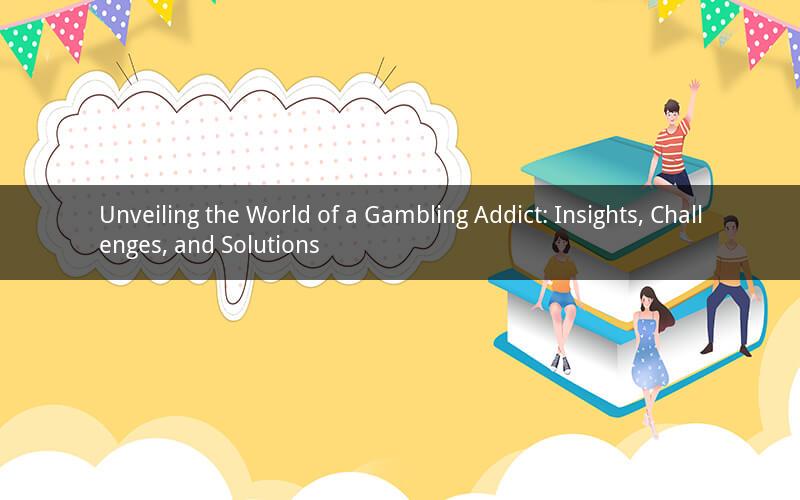
In today's fast-paced and technologically advanced society, gambling has become an increasingly popular form of entertainment. However, for some individuals, it evolves from a leisure activity into an addiction, causing severe disruptions in their lives. This article delves into the world of a gambling addict, exploring the causes, effects, and possible solutions to help those struggling with this detrimental habit.
I. Causes of Gambling Addiction
1. Genetic Factors: Studies have shown that genetics play a significant role in the development of gambling addiction. Individuals with a family history of addiction or mental health issues may be more susceptible to developing gambling problems.
2. Environmental Influences: Growing up in a culture where gambling is readily available and socially accepted can contribute to the development of gambling addiction. Additionally, exposure to gambling advertisements and promotions can also encourage individuals to engage in risky behaviors.
3. Psychological Factors: Individuals with low self-esteem, anxiety, or depression may turn to gambling as a means to escape their problems or to experience a sense of control and excitement. However, this temporary relief often leads to a cycle of dependency.
II. Effects of Gambling Addiction
1. Financial Consequences: One of the most immediate and significant consequences of gambling addiction is financial ruin. Individuals may go into debt, sell valuable possessions, or even steal money to support their gambling habits.
2. Relationship Damage: As gambling addiction progresses, it can lead to strained relationships with family and friends. Trust issues, financial disputes, and emotional neglect are common consequences of this addiction.
3. Mental Health Issues: Individuals struggling with gambling addiction are at a higher risk of developing mental health problems, such as depression, anxiety, and substance abuse disorders. These issues often exacerbate the addiction, creating a challenging cycle to break.
III. Treatment and Support
1. Professional Help: Seeking help from a mental health professional, such as a therapist or counselor, is crucial in treating gambling addiction. These professionals can provide personalized strategies for overcoming addiction and developing healthier coping mechanisms.
2. Support Groups: Joining a support group, such as Gamblers Anonymous or SMART Recovery, can offer individuals a sense of community and camaraderie. Members can share their experiences, offer encouragement, and learn from others who have faced similar challenges.
3. Financial Counseling: In cases where gambling addiction has led to severe financial consequences, seeking help from a financial counselor can assist individuals in regaining control over their finances and creating a budget to prevent future problems.
IV. Preventing Gambling Addiction
1. Awareness: Educating oneself about the risks and consequences of gambling can help individuals make informed decisions and avoid falling into addiction.
2. Responsible Gambling: Setting limits on the amount of time and money spent on gambling, as well as being aware of the warning signs of addiction, can help prevent the development of gambling problems.
3. Seek Help Early: If someone suspects they or a loved one is developing a gambling addiction, it's essential to seek help as early as possible. Early intervention can significantly improve the chances of overcoming the addiction.
V. Conclusion
Gambling addiction is a complex issue with various underlying causes and consequences. Understanding the factors that contribute to addiction, recognizing the signs, and seeking help are crucial steps in overcoming this detrimental habit. By taking action and seeking support, individuals can regain control of their lives and break free from the clutches of gambling addiction.
Questions and Answers:
1. What are the most common signs of gambling addiction?
Answer: Common signs include an inability to control gambling behavior, borrowing money to finance gambling, feeling restless or irritable when not gambling, and prioritizing gambling over other responsibilities.
2. How can I help a loved one who is struggling with gambling addiction?
Answer: Encourage them to seek professional help, attend support groups, and set boundaries to prevent financial support for their gambling habits. Educate yourself about gambling addiction to better understand their struggles.
3. Are there any medications that can help treat gambling addiction?
Answer: While there are no specific medications for gambling addiction, some individuals may benefit from medications used to treat co-occurring mental health issues, such as depression or anxiety.
4. Can gambling addiction be cured?
Answer: While there is no guaranteed cure for gambling addiction, with proper treatment and support, many individuals can overcome their addiction and lead healthy, fulfilling lives.
5. How can I prevent my child from developing a gambling addiction?
Answer: Set a positive example by practicing responsible gambling habits, discuss the risks and consequences of gambling, and monitor their exposure to gambling advertisements and promotions.